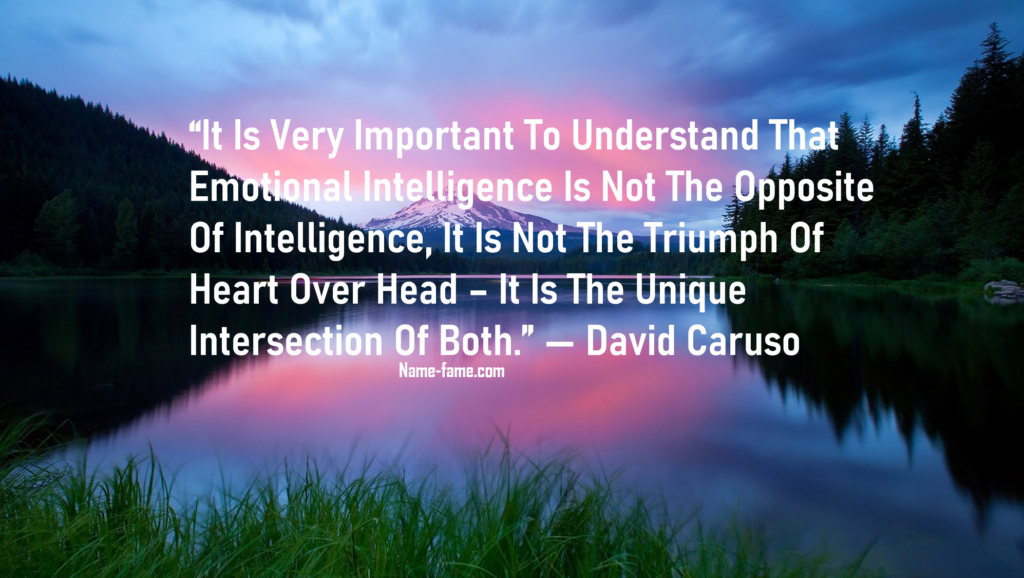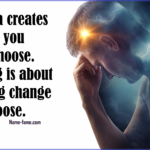The process of recognizing your own emotions and those of others, controlling your emotions, inspiring your emotions, and coordinating your emotions to accomplish desired goals is known as emotional intelligence (EI). It calls for social awareness, social skills, self-regulation, self-motivation, and self-awareness.
To be successful in your personal, professional, and social life, emotional intelligence is a necessity. The majority of effective leaders have emotional intelligence. It aids in improving self-awareness, reducing tensions, and fostering fraternity. It expedites their career progression.
The most important component of emotional intelligence is empathy. Empathy is the capacity to put oneself in another’s shoes and view situations from their point of view. If you watch leaders, you’ll notice that they say less and listen more in order to understand their followers. When followers show pity, leaders show empathy, and this creates a subtle distinction between followers and leaders.

Emotional intelligence benefits
The ability to manage emotions improves self-awareness. By achieving a balance between the mind, heart, and gut, it enhances decision-making abilities. It fosters interpersonal bonds. You get soft skills as a result. This increases empathy. It aids you in gaining complete control over both your environment and yourself when adverse conditions exist.
SEE ALSO: How to Create Your Own Empire and Success
It enables steadiness under pressure by assisting you in taking action rather than simply reacting to problems. Conflicts are avoided, and stress levels are reduced. It gives you contentment and joy. You inspire others and yourself. You can become aware of your triggers and maintain your attentiveness.
According to research, emotional intelligence may be responsible for up to 31% of success in managerial situations. As employees learn to understand and appreciate others, workplace disputes are reduced. It encourages positive interpersonal relationships.
Understanding different personality types’ sentiments, moods, and emotions at work facilitates getting along with them. Performance and productivity are improved. Above all, it aids in assertively dealing with challenging people.
How to Develop Emotional Intelligence
Executives who advance must possess greater emotional intelligence since managing such a profile requires more interpersonal skills than technical expertise. It’s critical to take the time to understand the motivations, emotions, and sentiments of others around you.
To better understand people’s feelings, we must empathize with their underlying reasons. In order to change our behavior and raise our emotional quotient score, we must occasionally acquire lessons.
- Empathic listening must be cultivated in order to increase EQ. Learn more about other techniques for enhancing emotional intelligence here.
- Develop empathy for others. Put yourself in their position to perceive and value things from their point of view. It not only makes life simpler for you, but it also promotes respect in the eyes of others. Building relationships with others is simple.
- Have empathy for other people. Respect their egos, emotions, and sentiments. Observe similarities rather than contrasts. You may quickly and readily connect with others when you find a point of commonality with them.
- Respect all countries, ethnicities, languages, faiths, and cultural traditions. It fosters a broad perspective that increases acceptance.
- Be sure to tie your intentions to your deeds so that you appear credible to those around you. Before expecting others to be punctual, set an example by being on time yourself.
- Resist the urge to get angry; it is your worst enemy. Anger saps resources and spreads unfavorable emotions. Start counting when you’re angry to distract your attention and help you forget your anger. You can count in either ascending or descending order. When you’re angry, drinking water and doing breathing exercises will help you calm down. More oxygen enters your brain during deep breathing, which reduces anxiety.
SEE ALSO: Qualities of Dynamic Individuals and How to Develop Them!
- Be confident. In this world, neither being aggressive nor meek is effective. In the end, assertiveness—the ability to firmly yet respectfully say “No”—works best.
- Whenever something goes wrong, use intrapersonal feedback. The best person to judge your behavior and emotions is you. You follow your moral principles. Intrapersonal feedback aids in behavior modification.
- Use logic and analysis to guide your judgments rather than following your emotions. Avoid making snap judgments. It doesn’t always follow that just because your best buddy had a horrible encounter with someone, that person is bad.
- In order to effectively lead others, people need to have high EQ levels. To do this, they must properly understand who they are.
Leadership Learning Challenges
Why is it difficult for everyone to develop leadership? Lack of EQ, which is primarily acquired via experience, is the fundamental issue that prevents people from succeeding as leaders. The success rate of leaders who possess EQ is higher.
Teachers that focus on teaching leadership often use anecdotes and case studies to motivate their students. One side of the coin is that. The other is for the leaders to put what they have learnt in the classroom into practice.
It is comparable to learning how to swim. The true challenge becomes apparent once in the water. Similar to this, individuals must experiment with leadership through active participation.
Yet, having theoretical understanding of leadership principles and characteristics helps one avoid blunders and gets them ready to take on issues head-on.
SEE ALSO:
EQ and IQ: What’s the Difference?
How does emotional intelligence vary from mental intelligence if it is a sort of intelligence? largely based on how it is measured. The score obtained through standardized tests created to gauge intelligence is known as one’s intelligence quotient (IQ). Your intellectual abilities, such as how well you absorb, understand, and apply information, are closely correlated with your IQ. Higher IQ individuals are better at thinking abstractly and connecting ideas in their minds.
The two are significantly different in emotional intelligence. Emotional intelligence, often known as EI or EQ (for Emotional Intelligence Quotient), is the ability to use emotions to improve our thinking and reasoning. Those with high levels of emotional intelligence are able to control their emotions, use them as a tool for thinking, and comprehend the feelings of others.
SEE ALSO: Why You Must Accept The Challenges
Some claim that IQ counts more in the job than emotional intelligence, while others counter that IQ matters more. No matter which is more crucial, emotional intelligence is unquestionably necessary at work.
Conclusions
There is an urgent need to concentrate on employee development as the global economy quickly transitions from manufacturing to services sectors and people quickly reinvent themselves as knowledge workers.
Leadership is one area that is quickly catching up, and it mostly depends on emotional intelligence. Also, it necessitates a certain level of IQ.
So, combining both IQ and EQ in a proportionate manner is necessary to attain leadership effectiveness and success.






